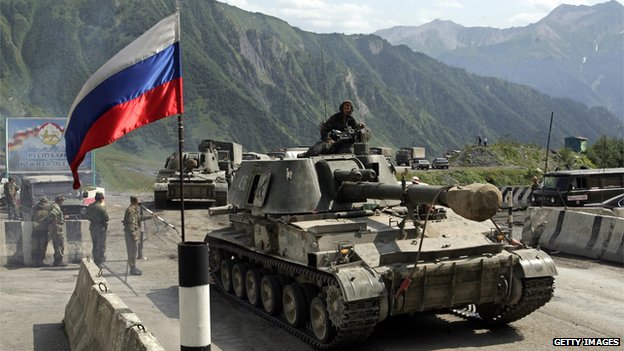
From Mark Kramer, PONARS Eurasia: The August 2008 Russia-Georgia war sparked great unease in the three Baltic states (Estonia, Latvia, Lithuania) and in Poland about the willingness of the United States and other key members of the North Atlantic Treaty Organization (NATO) to defend them against Russian military pressure or even a possible attack , unlikely though that might seem.
One of the consequences of this apprehension was an effort by NATO military planners in December 2009 and January 2010 to expand the alliance’s Eagle Guardian “defense plan,” which initially applied only to Poland, and have it cover the whole “Baltic region.” Senior U.S. and German officials tried to keep the revised contingency planning secret, but some details began leaking out in early 2010, and then the posting of huge collections of secret documents on the Wikileaks website in 2010 and 2011 left little doubt about what was going on. Neither the United States nor especially Germany had initially wanted to produce contingency plans to defend the Baltic states, for fear that such an effort would damage relations with Russia if it became publicly known. But persistent pressure by the Baltic governments spurred U.S. and German officials to agree to a compromise whereby the already existing Eagle Guardian plan for Poland would be expanded, an approach that was not especially welcome in Warsaw. Polish officials were, however, willing to embrace the expanded contingency plan, provided that Poland was treated separately in it and that U.S.-Polish bilateral military cooperation would increase.
One of the risks is the intensification of a security dilemma in which the steps taken by large NATO states to protect the security of smaller allies are seen as threatening by the Russian authorities, who then take military steps to counter NATO preparations, which in turn could lead to even greater efforts by NATO. The initial cycles of the security dilemma, as shown below, have already been apparent. The different interests and outlooks of the NATO states involved in Baltic defense gave Russia possible avenues for trying to play the parties against each other and thereby undercut the military planning, but instead the Russian authorities responded in ways that hardened, rather than weakened, NATO’s resolve. At a time when xenophobic anti-Westernism has pervaded Russia’s political discourse and Russian political leaders have been playing up supposedly “threatening” actions by NATO, the security dilemma may heighten the risk of a crisis or confrontation. . . .
The expansion of the Eagle Guardian plan helped to alleviate the Baltic governments’anxiety about military threats from Russia, and in this sense it may have given the three states greater confidence about improving ties with Russia. The revised planning was less successful in addressing Polish leaders’ concerns because it was not accompanied by a sharp increase in U.S.-Polish bilateral military cooperation and U.S. troop deployments on Polish soil. These shortfalls resulted in a net deterioration of U.S.- Polish ties.
The disclosure of NATO’s deliberations and planning documents at an early stage in the Obama administration tarnished the administration’s much – ballyhooed “reset” of relations and eroded NATO’s credibility in its dealings with Russia, including its repeated statements insisting that “NATO does not view Russia as a threat.” Perhaps if Dmitri Medvedev had stayed on as Russian president, the damage from the disclosures would have abated relatively quickly and would not have hindered closer ties via the NATO-Russia Council. But with the return of Vladimir Putin and the Russian government’s growing invocation of flamboyant anti-Westernism, the adverse impact of the disclosures will not dissipate anytime soon.
Among other things, the Russian army since 2010 has stepped up its military exercises simulating attacks against the Baltic states and Poland. The Zapad 2013 exercises that are due to be held later this year will apparently be similar to Zapad 2009 and Zapad 2011, including preventive nuclear strikes against Poland. NATO can offset such posturing by responding with its own Steadfast Jazz exercises of rapid-response forces, but Russia’s shift toward belligerence and military competition is bound to take its toll.
All of this raises the question of what would happen in the unlikely event that Russia did attack the Baltic states. Presumably, the United States and other NATO member states would feel compelled to uphold Article V by embarking on military action to defend the Baltic states, as envisaged in the Eagle Guardian plan. In so doing they would in effect be going to war against Russia. At worst, such a step would risk escalation to a nuclear exchange; at best, it would require the NATO countries to fight in a region in which they would be at a severe geographic disadvantage. On the other hand, if the United States and its allies decided not to fulfill Article V in the Baltic region and to refrain from intervening against Russian forces, this would gravely damage the credibility of all of NATO’s defense commitments. Why would any country want to belong to an alliance that refused to protect its members against external aggression?
The drafting of the expanded Eagle Guardian plan was a valuable and necessary process for NATO, but the public disclosure of it entailed significant costs. The dilemma that would face the alliance if the “unthinkable” were to happen in the Baltic region might be easier to manage now that contingency plans are in place to offer a range of options, which can be tested in command-staff and live exercises. In the end, however, the choices NATO governments will have to make will be onerous no matter how good the plans are.
Mark Kramer is Director of the Cold War Studies Program and Senior Fellow at the Davis Center for Russian and Eurasian Studies, Harvard University. (photo: Getty) (via Alexander Cooley)
Image: getty%207%2017%2013%20Russia%20Georgia%20war.jpg
